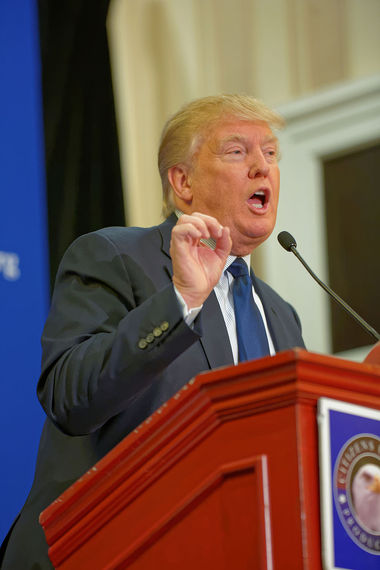
A Donald Trump nomination would probably mean the immolation of the Republican Party. Democrats should not cheer it. Opposition and criticism -- the collision of idea against idea -- has historically kept the Democratic Party intellectually vibrant and politically sharp. Periods of uncontested rule have almost invariably been times of laxity and overreach.
Woody Hayes, late of Ohio State, is said to have remarked that three things can happen when a football is thrown, and two are bad. Two things can happen if Trump is nominated, and for the Republican Party -- the old Republican Party, the institutional embodiment of genuine conservatism, an institution already under strain -- both are bad. Either he loses or he wins.
If the former, it is likely to be a rout from which the Republicans cannot recover, at least anytime soon. Virtually the whole of the party's leadership will have been discredited if not defeated, barring a courageous decision to apply a tourniquet to his candidacy by repudiating it.
The alternative, perhaps worse for Republican fortunes, is that he wins and reduces the party of Lincoln -- born in opposition to chattel slavery -- to mere devotion to the letter "R."
Nothing but the latter can explain the reflexive pledges to "support the nominee" from intelligent Republican statesmen and women who both know and have said Trump lacks the temperament, experience and judgment -- not to mention the decency -- to occupy the chair where Washington and Lincoln sat. Similarly, RNC Chair Reince Priebus demonstrates no sense that a party is a group devoted to specific, discrete ideas. It is, instead, on his account, devoted to winning offices simply, regardless of what ideas serve that goal. "You know what," he declares, dismissing concerns about Trump tearing the Republicans apart, "winning is the antidote to a lot of things."
This is true as far as it goes, but it does not go as far as explaining what a party is. If the Republican Party won by nominating a candidate who was, say, pro-choice and protectionist -- a nomination, incidentally, it is apparently poised to make -- would it still be the Republican Party? Something is in a name, but not that much. Similarly, if the Democratic Party were to nominate someone from the far right on the grounds that he or she was willing to apply a "D" next to his or her name, it could hardly still be called the Democratic Party insofar as that institution is defined by its beliefs and not by a letter.
To stand for something is, inherently, to stand for something exclusive: for this and not for that. It is not to be subject to what has rightly been called a hostile takeover fueled in no small part by voters who had never before been part of the organization being redefined -- which is, by the way, another reason nominees should be chosen in conventions and not by popular vote, a topic for another day. The point for now is this: the Republican Party cannot, anymore than the Democrats, be defined by the label a candidate, win or lose, self-applies. If it so succumbs, it is no longer a political party rightly understood.
Consequently, in either Trump scenario, win or lose, the Republican Party (which is not to say the conservative intellectual movement) effectively ceases, or begins to cease, existence. This -- which brings us to the fortunes of Democrats, who have seen this movie before, though with a different ending.
In 1964, Barry Goldwater was routed -- what we now know to be the precursor to a conservative resurgence. But the talk at the time was of the Republican Party's apparent demise, which is what a Trump nomination would actually mean. The Democratic response in 1964, with no Republican opposition immediately in sight, was a wildly ambitious Great Society that departed from the New Deal model, seeking not merely to alleviate poverty but also to dictate the precise and socially transformative terms of relief.
Daniel Patrick Moynihan, then a young veteran of the Kennedy and Johnson administrations, warned against headiness, welcoming the strong Republican showing in the 1966 Congressional elections, especially given the number of pro-civil rights candidates the party sent to Capitol Hill. He later recalled: "There had been much talk of the United States moving toward a 'one and one-half party system,' with the Democrats permanently in office and the Republicans a kind of Whig or Federalist remnant. That would have been bad for Republicans and worse for Democrats."
Why worse? Because antagonism sharpens and acquiescence dulls. Thus Moynihan's proclivity toward personal and intellectual friendships with those with whom he disagreed, which included Republicans and conservatives of the old school. He was himself a friendly critic of liberalism, not to undermine but rather to undergird it. Note the "our" in this reflection on his first Senate candidacy: "I ran as a liberal willing to be critical of what liberals had done. If we did not do this, I contended, our liberalism would go soft."
Liberalism has been known to go soft in periods of unchallenged rule. Forty years of it cleared the way for Newt Gingrich's intellectual challenge, which caught the Democratic Party all but unawares. So by all means, run hard. But for Democrats, an ambition to beat the Republicans is one thing; wishing their demise as a tenable political institution is another. Both parties thrive on credible antagonists. Democrats need real conservatism -- not recent variations on that theme, but the genuine article -- to be embodied in a viable institution. That is one reason -- there are ample others -- to hope Trump is stopped before he destroys the Republican Party, if not more.
- Publish my comments...
- 0 Comments
